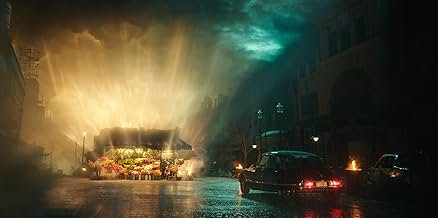Un architetto vuole ricostruire utopicamente New York a seguito di un disastro devastante.Un architetto vuole ricostruire utopicamente New York a seguito di un disastro devastante.Un architetto vuole ricostruire utopicamente New York a seguito di un disastro devastante.
- Regia
- Sceneggiatura
- Star
- Premi
- 2 vittorie e 16 candidature totali
- Huey Wilkes
- (as Bailey Ives)
Riepilogo
Recensioni in evidenza
The film's plot revolves around the ideological clash between the prodigious architect Cesar Catalina, a Nobel laureate, and Frank Cicero, the mayor of New Rome-a futuristic New York City. While the politician governs with his eyes set on the past, relying on experience and tradition in his decisions, the architect dreams of radically transforming life through a utopia enabled by "megalon," a miraculous material. Throughout the film, Coppola denounces the rampant hypocrisy and corruption of contemporary Western society. The spectacle of life, the manipulation of information, the commercialization of sex-all these are symptoms of a morally bankrupt empire, led by a decadent elite lost in excess and vanity. The only way out for such a civilization appears to be the reform envisioned by Cesar. He believes he can resolve all social contradictions through his "megalon," raising a new world from the ruins of New Rome. To achieve this, he must overcome skeptics and survive the vicious.
Although *Megalopolis* was originally conceived over twenty years ago, the discussions Coppola raises are strikingly relevant, especially in his critique of mass media and mass politics. The film has a beating heart and can engage the viewer in its most intense moments. What it unfortunately lacks, however, is structure and substance. Coppola paints his film like a Pollock painting, yet without any sense of harmony or flow in his brushstrokes, and the result is a chaotic and disjointed work. *Megalopolis* is laden with intention and argument, but it lacks direction, lacks synthesis, and fails to turn its theme into poetry. The film blends grandiose imagery, bolstered by a thunderous score, with the ridiculous, as crude visual effects bring a cheap surrealism to life. The dialogues are eloquently robotic, and they only function because of the actors who manage (which is a testament to the quality of the cast) to convey some humanity to their characters. Coppola fails to present New Rome as a believable, palpable world, which limits the viewer's ability to become involved. At no point does the city appear as anything more than a metonymy for America, and its inhabitants are not particularly compelling.
The film is also packed with homages to classics that inspired the director, with one scene, for instance, evoking the epic *Ben-Hur*. Amid so many tributes, one stands out, perhaps to the detriment of the film itself. From its very title, *Megalopolis*, comparisons with Fritz Lang's legendary *Metropolis* become inevitable. Coppola's production, in some ways, is almost a modern reinterpretation of the German master's work, with some parallels between the two films. In both, the protagonist is a wealthy young man trying to address the terrible inequalities of a futuristic society. And in both, love is a positive force that drives change-the man who loves yearns to transform society. But while *Metropolis* is flawless in its presentation, *Megalopolis* fails to convince. It does not impress with its visuals, which are largely uninteresting; it does not deliver an engaging plot, nor memorable characters. It has the virtue of saying exactly what the filmmaker wanted to say-it is assertive and confident in its message without being, however, preachy. But a dozen well-thought-out metaphors do not make a good movie.
Coppola may have become a prisoner of his own myth. Many refuse to accept anything less than a masterpiece from him, and *Megalopolis*, unfortunately, is not one of his better moments. It is a film ambitious in concept but weak in execution. It engages with the issues of its time but fails to create pathos. It reaffirms faith in humanity and the transformation of the world, but it lacks a story and characters that could amplify its message. It is certainly not a triumphant return for the director, but it is not a detestable piece of work either. For viewers willing to intellectually engage with the film and forgive its flaws, *Megalopolis* can capture attention and reasonably convey its director's ideas. It can even entertain, as the actors are fully invested in the script's quirks, and there is something charming about Coppola's vision for the future of humanity.
That said, it is natural to be skeptical of what is essentially an admiring biopic of Robert Moses. Especially when it has apparently been written by Ayn Rand as a reply to METROPOLIS and then handed to Abel Gance after convincing him he's making a movie about Julius Caesar instead of Napoleon. And don't forget the quotations from Marcus Aurelius.
It is, in sum, a very learned movie. To appreciate the details, you need to have read extensively in Roman history, seen a lot of silent films, and be familiar with New York City in the second half of the 20th Century, including the flight of the middle and upper classes from the 1950s through the 1980s. Through the vagaries of my upbringing and a chaotic course of self-education, I can claim those things. So. What do I think?
The performances are fine. However, I am left with the question, as I am about so many movies these days, of who Coppola made this movie for. It is claimed he spent about $140 million of his own money on this feature. The general rule is that a movie has to gross about twice its production cost to break even. I can't see a large enough audience for this to produce $300,000,000 in tickets and secondary rights. It is simply too long, a shaggy dog story about love and artistic vision being more important than anything else.
This would not, of course, be the first time that Coppola has let his artistic ambitions explode on him; even though it is claimed APOCALYPSE NOW eventually made its money back, I have my doubts about that if you add in interest costs. Certainly ONE FROM THE HEART was a disaster, and he spent a couple of decades making nicely commercial movies from other sources to dig his way out, and let the wineries and restaurants make him money. Neither do I believe this movie will ruin him. There are certainly enough movies buffs around to make the net loss from this bearable.
All of which goes a long way to answering my question of who Coppola's intended audience was. It was Coppola himself, an attempt to prove himself the complete film maker, instead of the fine translator of others' well told tales. I hope he likes what he has wrought.
It's also the kind of movie where I'm not sure overanalysing will help. Coppola is trying to say so much in one film, and a good part of it comes out nonsensical as a result. There were a few points during the film where I wondered if it was all some practical joke. It might mean a lot to him, or maybe only parts do and the rest of the time, he's laughing at us.
Somehow, all at once, I'm disappointed, exhausted, confused, and impressed. There's a certain balance here with the entertaining and boring. Visuals that look striking alongside parts that are visually garish. It's a movie that film buffs will argue about and remember while 99% of the population will continue to live their lives in blissful ignorance of its existence.
I can't quite decide whether it would be better to have be among the blissful many or the baffled 1%. I can offer no advice to anyone else who's considering giving it 138 minutes of their finite time. I'm glad I saw it and I also feel it was a bit of a waste of time.
Lo sapevi?
- QuizFrancis Ford Coppola wrote the script in the early 1980s, but the film was kept on the back-burner partially due to his financial debts. Pre-production finally began in 2001 after filming 30 hours of second unit footage and holding table read with Paul Newman, Uma Thurman, Robert De Niro, James Gandolfini, Nicolas Cage, Leonardo DiCaprio, Russell Crowe, Edie Falco, and Kevin Spacey, but the project was scrapped after the September 11 attacks, because a scene from the script (page 166) "predicted" the attacks. Coppola fully abandoned the project in 2007, and didn't begin developing it again until 2019.
- BlooperAt 21:47, Julia Cicero's voice changes mid sentence: "I sent a letter to you last night. A childish letter", then it goes instantly deeper with "and I want it back before you read it" revealing ADR work.
- Citazioni
Cesar Catilina: *You* wanna help me?
Julia Cicero: Yeah. And, well, I... well, I want to learn.
Cesar Catilina: And you think one year of... medical school entitles you to plow through the riches of my Emersonian mind?
Julia Cicero: Entitles me?
Cesar Catilina: Yes.
Julia Cicero: [scoffs] Entitles me?
Cesar Catilina: Yeees!
Julia Cicero: Entitles me?
Cesar Catilina: YEEEEEES!
Julia Cicero: You have no idea about me! You think I am nothing, just a socialite?
Cesar Catilina: No, not nothing, but I reserve my time for people who can think. About science. And literature, and... architecture and art. You find me cruel, selfish and unfeeling? I am. I work without caring what happens to either of us. So go back to the cluuuub, bare it all, and stalk the kind of people that you enjoy.
Julia Cicero: Fine! I will.
Cesar Catilina: Come back when you have more time!
- Versioni alternativeThe "Ultimate IMAX Experience" version of the film features a live actor asking questions during the filmed press conference.
- ConnessioniFeatured in Jeremy Jahns: Megalopolis - Movie Review (2024)
- Colonne sonoreMy Pledge
Written by Grace VanderWaal
Performed by Grace VanderWaal
Courtesy of Columbia Records
By arrangement with Sony Music Entertainment
Produced and Orchestrated by Kris Kukul
I più visti
- How long is Megalopolis?Powered by Alexa
Dettagli
- Data di uscita
- Paese di origine
- Siti ufficiali
- Lingue
- Celebre anche come
- Megalópolis
- Luoghi delle riprese
- Aziende produttrici
- Vedi altri crediti dell’azienda su IMDbPro
Botteghino
- Budget
- 120.000.000 USD (previsto)
- Lordo Stati Uniti e Canada
- 7.629.085 USD
- Fine settimana di apertura Stati Uniti e Canada
- 4.007.797 USD
- 29 set 2024
- Lordo in tutto il mondo
- 14.387.154 USD
- Tempo di esecuzione2 ore 18 minuti
- Colore
- Mix di suoni
- Proporzioni
- 2.00 : 1
Contribuisci a questa pagina










































